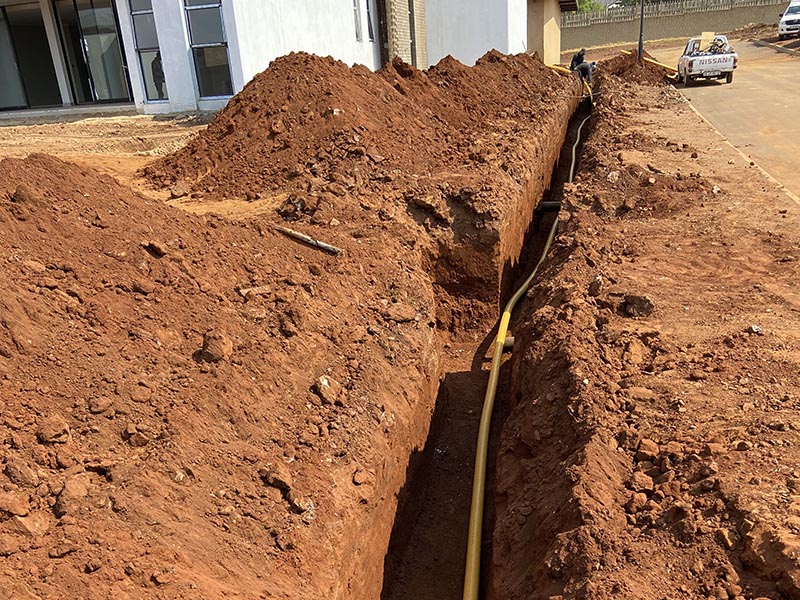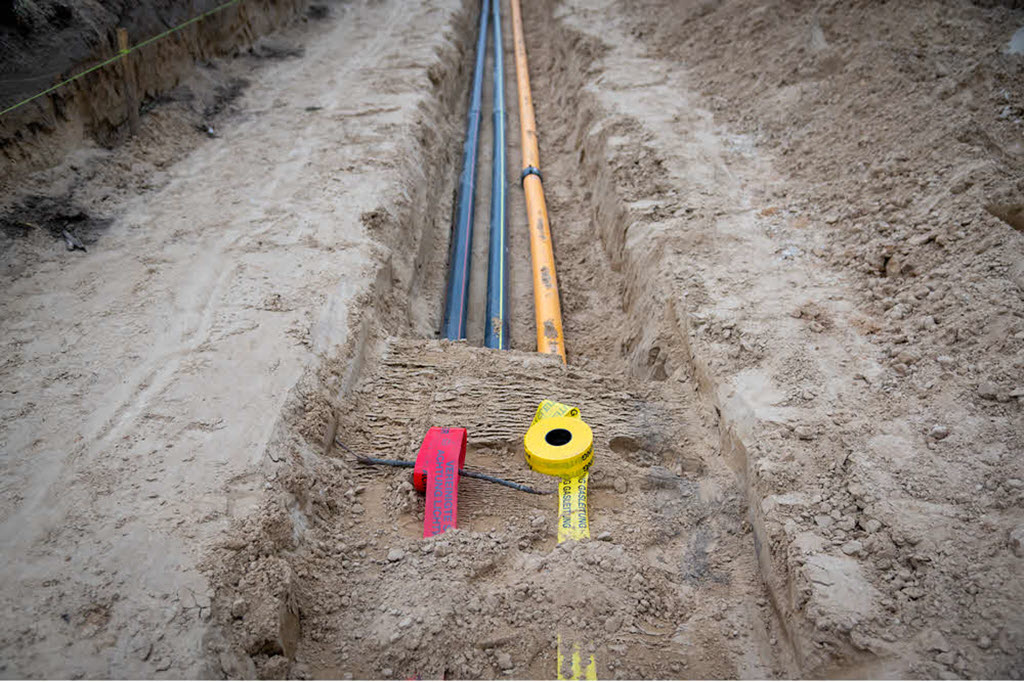Gas Line Servicesin Richmond MI
Safe and Efficient Gas Line Installation for Your Property
We Are Locally Owned & Operated For Over 37 Years
Contact Us Today!
We Serve Businesses In And Around The Following Cities:
About Gas Line Services
Understanding the Complexity and Importance of Gas Line Systems in Richmond
Properly installed and maintained gas lines are an integral part of any commercial property. These vital conduits carry natural gas with a reliable and consistent pressure to appliances and HVAC systems, powering various operational needs. Consequently, precise planning and professional implementation are crucial to ensure efficient and safe usage. In the heart of urban landscapes like Richmond, understanding gas line installation’s delicate process becomes undeniably significant.
Exploring the Fundamentals of Gas Line Installation
The journey of installing a gas line begins with a comprehensible understanding of the facility’s requirements. The core considerations concern the property’s existing architecture and the appliances needing a gas supply. Then, there is a decisive selection between different types of gas lines. The traditional metal conduits, like copper gas lines, boast durability. Alternately, modern options like CSST (Corrugated Stainless Steel Tubing) or flexible gas lines, offer extensive adaptability and ease of installation. However, there are instances when unique circumstances may necessitate a plastic gas line or an underground gas line, specifically designed for external use. A trusted local contractor such as D&J Contracting, renowned for understanding the specific needs of Richmond commercial properties, can provide the most appropriate solutions to these complex decisions.
The Intricate Process of Installing a Gas Line
Gas line installation is not merely about connecting a pipe from the gas meter to appliances. It is an exact science that begins with a thorough assessment of the building’s layout, requirements, and local regulations. Once the groundwork is determined, the actual installation process is initiated. This involves creating an appropriate path for the pipe, installing fixtures and valves, ensuring secure connections, and testing for leaks. While the exact method may vary depending on whether it is a natural gas line or a propane line, the underpinning principles remain the same. Experienced teams from D&J Contracting can offer the needed expertise, instruction, and practical execution to accomplish this task efficiently and professionally.
Benefits of a Well-Maintained Gas Line System
Securing a well-launched gas line system is not just a matter of practical convenience; it has pivotal benefits. An efficiently running gas line reduces the risk of leaks, contributing to the safety of the premises. It also ensures uninterrupted service, enhancing the efficiency of appliances. A professionally installed gas line can also impact energy conservation, leading to lowered operation costs. Services like adding a gas line or replacing an obsolete one, when performed appropriately, deliver extended productivity and longevity, significantly justifying the investment.
Real-World Applications & Customization
The requirements for gas lines can be incredibly diverse, depending on the nature of the commercial establishment and its particular demands. For instance, a restaurant may need a gas line for a BBQ grill or a modern gas fireplace in addition to the kitchen appliances. A corporate building may require gas lines to power heating and cooling systems. Even a residential property can have distinct demands like having a natural gas line for outdoor grills or perhaps running the fire pit gas line. Each of these applications necessitates a specific array of flexible gas lines, CSST gas lines, or perhaps an underground gas line, all installed expertly by experienced professionals like D&J Contracting.
Elevating Property Value with a Quality Gas Line System
A well-planned and installed gas system not only serves immediate operational needs but significantly elevates a property’s commercial value. Potential buyers or lessees often make decisions impacted by the presence and the performance of a gas line system. Thus, decisions about installing a new gas line or upgrading an existing one extend beyond short-term considerations and have long-lasting impacts.
In conclusion, harnessing the power of gas lines in optimizing commercial properties is increasingly becoming a preferred choice for property owners and managers. Richmond, with its melting pot of restaurants, residences, office buildings, and event spaces, presents a vast spectrum of unique challenges and opportunities related to gas line installation. Thus, entrust your commercial building’s gas line needs in the hands of experienced local experts like D&J Contracting to ensure your property is safe, efficient and ready for future needs.
Gas Line Services Gallery


Call Us Today to receive your Free Quote for
Gas Line in Richmond
Serving: Richmond, Michigan

About Richmond, Michigan
In 1835, Erastus Beebe set out with two brothers and several other people to create a new city out of a wilderness area in Michigan. He founded Beebe’s Corners, which in 1878 agreed to join with the two nearest neighboring communities of Ridgeway and Cooper Town to form the village of Richmond. In 1879, the Michigan Legislature officially created the village charter. In 1989, the city annexed the Muttonville area of Lenox Township, parts of Richmond Township in Macomb County, and part of Casco and Columbus Townships in St. Clair County.
Richmond is 38 miles (61 km) northeast of downtown Detroit, 16 miles (26 km) northeast of Mount Clemens, the Macomb county seat, and 26 miles (42 km) southwest of Port Huron, the St. Clair county seat. Highway M-19 passes through Richmond as its Main Street, leading north 6 miles (10 km) to Memphis and south 7 miles (11 km) to New Haven.
The city is adjacent to Richmond Township and Lenox Township in Macomb County, although it is administratively autonomous. It is also adjacent to St. Clair County’s Columbus Township and Casco Township.
According to the United States Census Bureau, Richmond has a total area of 2.92 square miles (7.56 km), of which 2.89 square miles (7.49 km) are land and 0.03 square miles (0.08 km), or 1.16%, are water.
- Muttonville is in the southeastern part of the city on the boundary with adjacent Casco Township in St. Clair County at 42°47′47″N 82°44′07″W / 42.79639°N 82.73528°W. It was so named because it was the principal slaughterhouse for what was predominantly a sheep raising area.
| Census | Pop. | Note | %± |
|---|---|---|---|
| 1880 | 750 | — | |
| 1890 | 1,074 | 43.2% | |
| 1900 | 1,133 | 5.5% | |
| 1910 | 1,277 | 12.7% | |
| 1920 | 1,303 | 2.0% | |
| 1930 | 1,493 | 14.6% | |
| 1940 | 1,722 | 15.3% | |
| 1950 | 2,025 | 17.6% | |
| 1960 | 2,667 | 31.7% | |
| 1970 | 3,234 | 21.3% | |
| 1980 | 3,536 | 9.3% | |
| 1990 | 4,141 | 17.1% | |
| 2000 | 4,897 | 18.3% | |
| 2010 | 5,735 | 17.1% | |
| 2020 | 5,878 | 2.5% | |
| U.S. Decennial Census | |||
As of the census of 2010, there were 5,735 people living in the city. The population density was 2,012.3 inhabitants per square mile (777.0/km). There were 2,479 housing units at an average density of 869.8 per square mile (335.8/km). The racial makeup of the city was 94.2% White, 1.0% African American, 0.3% Native American, 0.2% Asian, 0.2% Pacific Islander, 2.6% from other races, and 1.5% from two or more races. Hispanic or Latino of any race were 4.6% of the population.
As of the census of 2000, there were 4,897 people, 1,977 households, and 1,332 families living in the city. The population density was 1,691.6 inhabitants per square mile (653.1/km). There were 2,062 housing units at an average density of 712.3 per square mile (275.0/km). The racial makeup of the city was 95.43% White, 0.25% African American, 0.31% Native American, 0.82% Asian, 0.18% Pacific Islander, 1.86% from other races, and 1.16% from two or more races. Hispanic or Latino of any race were 4.74% of the population.
There were 1,977 households, out of which 31.9% had children under the age of 18 living with them, 53.1% were married couples living together, 10.1% had a female householder with no husband present, and 32.6% were non-families. 27.8% of all households were made up of sole individuals and 11.0% had someone living alone who was 65 years of age or older. The average household size was 2.45 and the average family size was 2.99.
In the city the population was spread out, with 24.2% under the age of 18, 9.0% from 18 to 24, 30.8% from 25 to 44, 22.7% from 45 to 64, and 13.3% who were 65 years of age or older. The median age was 36 years. For every 100 females there were 92.1 males. For every 100 females age 18 and over, there were 89.6 males.
The median income for a household in the city was $43,378, and the median income for a family was $57,917. Males had a median income of $41,519 versus $26,445 for females. The per capita income for the city was $21,384. About 4.8% of families and 6.2% of the population were below the poverty line, including 7.2% of those under age 18 and 5.4% of those age 65 or over.
The Richmond Community School District covers areas of Richmond, Lenox, Casco, and Columbus townships. It includes an elementary, middle, and high school. In 2002, it had approximately 2,000 full-time students and a teacher/student ratio of 1:20. St. Augustine is a Catholic Elementary School in the city and St. Peter’s is a Lutheran Elementary School in the city.
Call Us Today to receive your Free Quote for
Gas Line in Richmond
Related Services in Richmond, Michigan
We Serve Businesses In The Following Zip Codes:
48007, 48015, 48021, 48026, 48035, 48036, 48038, 48042, 48043, 48044, 48045, 48046, 48047, 48048, 48050, 48051, 48066, 48071, 48080, 48081, 48082, 48083, 48084, 48085, 48088, 48089, 48090, 48091, 48092, 48093, 48098, 48099, 48225, 48230, 48236, 48310, 48311, 48312, 48313, 48314, 48315, 48316, 48317, 48318, 48397